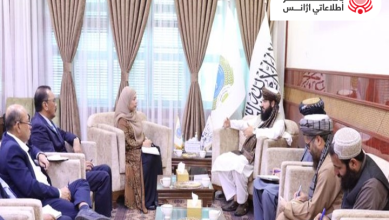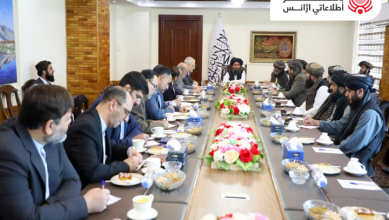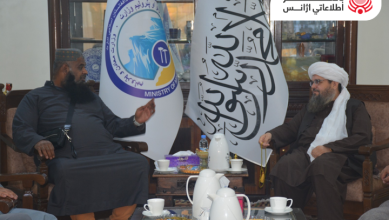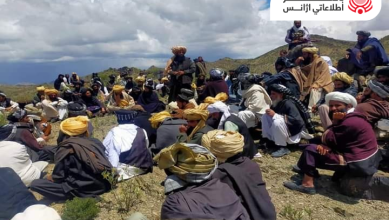
Kabul (BNA) In the name of Allah, the Compassionate, the Merciful
The First Lady;
First Vice President Saleh
Second Vice President Danish
Members of the Cabinet,
Ambassador von Brandt [Ambassador and Head of Delegation of the EU in Afghanistan]
Ambassador Alison Blake [The UK Ambassador to Afghanistan]
Ambassador Deborah Lyons [The UN Secretary-General’s Special Representative for Afghanistan]
Distinguished guests,
Members of the business community,
Members of civil society
Fellow citizens;
It is a pleasure to participate in this discussion. Let me first express the deep sympathies of the Afghan people and government for the losses that Covid-19 inflicting on societies of our partners. Horrible news; but I hope that the development of vaccine and coordinated international work will enable us to move forward.
I am going to focus on imperatives, governance and tools of governance, and conclude with actions.
Our fundamental drive from the perspective of the Afghan citizens for effective governance and combatting corruption is the gap between our expectations and our resources. Thanks to your generosity, this society’s expectations are of an upper middle-income country while our resources, existing resources, are of one of the least developed countries. Without a strategy to develop wealth, we will be dealing with eternal frustration because once expectations are set, they are not going to be lowered.
And the society fortunately is a vital national discussion that is product of the freedoms that we enjoy under our constitution, one of the freest media in the world in a truly open discussion. But the discussion now needs to focus on how we both manage our expectations and how we fulfill them.
Key to this is development of the considerable natural capital, one trillion dollars and expanding. The picture on mining and oil and gas is improving by the day. But our most fundamental capital is our location, and our location again is becoming solid gold because the large-scale projects that we are awaiting for centuries are underway. TAPI this year is going to start construction in Afghanistan and a whole range of other projects that I could explain.
Here our greatest new development is Fortescue’s engagement with us. 20,000 megawatts of power are to be produced from the water resources of Afghanistan. It would enable us to then develop our metals totally on the basis of green standards. And I am delighted that 120 Afghan engineers will be shortly leaving for Australia. We have not received this type of sustained human capital investment in a very long time. All of these are being chosen, but in order to attract Fortescue, we were one of 120 countries under considerations and one of six to be chosen in a shortlist and that was arrived at within three days of very intensive work because the investment unit in the presidency ensured that Fortescue could be assured that there will be zero corruption. And I thank Vice-President Saleh and Vice-President Danish for their immense support in this regard.
What this means is if we want to realize the potential one trillion dollars and then continue it on an ongoing basis, we have to adopt international standards on trade, transit and investment, and align our government systems to the goal of creating wealth.
We also must adopt the current state of the play. I completely agree with Ambassador Lyons; we must do more with less. This has two dimensions. First, the cost of delivering infrastructure and services is totally unacceptable and we have made breakthroughs to show that we can deliver much more with much less. The Darulaman Palace, the 1000 mosques under construction, a number of dams and others show that the cost can be brought down, quality can be enhanced. The key to that has been the adoption of Singapore housing model on the part of our presidential delivery unit and the national company. And we are delighted that ADB accepted this company to build fifteen hospitals within a seven months period. A lot more should be done with a lot less. Our main focus now is on the cost of infrastructure, particularly roads.
All of our efforts, about eighty percent of our efforts in managing Covid came from reallocation of existing aid portfolio. We are incredibly grateful to all of you around the table, and for the World Bank and ADB for agreeing to those. It was not new money. Allocation is fundamental, and the problem of right allocation and right expenditure that we will come to.
We need to demonstrate our case, and particularly the issue here is competitive funds. The test of every ministry for me is how much they are able to get from competitive funds. All of you, particularly the European Union, has a lot of these competitive funds and second is environmental funds. We have to mobilize to get resources.
And last but most importantly; peace-building. Peace-building is going to require at least re-integrating three million more Afghans who are now living in Pakistan and Iran, and stabilizing the internally displaced and others. Without trust, and I completely agree, Ambassador von Brandt on your emphasis on trust. Without trust, the society will be ripped to pieces by entry of three million people because we have absorbed ten million people in the last nineteen years, four millions of them during the last…It is a race because if you don’t get to 7-9 percent rate of growth, poverty is going to increase. And poverty is our fundamental problem because a lot comes from this.
Given this, we need to take effectiveness as the positive agenda and the corruption as the necessary agenda to get the necessary and sufficient conditions for stability, peace and prosperity.
There is good news. The good news is on the state of play on governance as a central concept of our time.
Factors accounting for policy success and failures are being documented rigorously. Great policies successes equally great policy failures are being documented very deliberately. Now we have established advices to us with whom we say what are our policy goals and which way would be goal, previously this type of data bank and resource centers did not exist.
We in the last six years have been dealing with turbulence, crisis and uncertainty as the continuous condition. Despite of this, we are facing how to create the conditions to get out of this, but the conceptual work that is being done and the operational implications of this are really becoming very relevant to us.
Added to this is that now pragmatism as an approach to problem solving and not just as a rule of thumb is making a very clear comeback. Particularly, lessons are being drawn as to how crises and unprecedented problems because there are two types of crises. One that are inherent to systems and one that are unprecedented.
The 2008 financial crisis, for instance, had very few precedence. And studies now document how these were dealt with and what are to be lessons to be drawn from it.
And equally significant, leadership, management, public participation and strategy; four key terms of our discourse were largely borrowed from the private sector literature. We have to reach to our roots and be able to understand that no one can speak for citizens except themselves. Everybody else is welcomed in the conversation but the Constitution of Afghanistan is citizen-based. Citizens’ rights and obligations are the core of our being and key to the survival of the Republic. We need to understand that everybody who attempts to speak in their name must have representation.
Today there is convergence in the development institutions. Asian Development Bank, IMF, OECD and the World Bank as well as bilateral aid organizations. What they are focused now is an enormous series of tools are available as to how to do budgeting, auditing, procurement; you name it. This shifts the balance because it shifts it from recommendation to standards that are applicable and measurable.
Unfortunately very little investment took place in accounting and auditing. You would think it is obvious.
The simultaneous developments in conceptual and operational levels allow for a focus and collaborative dialogue on corruption between governments and developmental partner, but more importantly for our society.
So let me reflect on what we have learned at least what I have learned because we need workshops and we need the national dialogue to say that these lessons…
First, political will at the presidency is necessary but not sufficient. Ministerial, provincial, municipal, district, rural, village and urban neighborhood need to be understood in their own terms and shaping strategies developed by, with and for them.
It is important to understand governance is not in our context dictation from the presidency. The presidency is a nodal point. A lot of things converged there but if you want delivery you need to have empowered people who are convinced of a consensus. The consensus, therefore, what we have today which I am delighted to share with you is consensus for effectiveness in fighting corruption between the two vice-presidents, myself and the top leadership team.
Delivery through third parties poses distinctive challenges of legitimacy and accountability. The latest example is Nuristan’s health sector. For months the NGO is unwilling, unable to pay the health workers. I created that program again, so we have no problem involving civil society in delivery but the roles and functions need to be very clearly differentiated. Those that are contractors are not civil society, they are contractors for services. Those that engaged in advocacy have a different role. So a differentiation of what constitutes rich array of institution called civil society needs to take place. And again the question of what is the effective way?
Citizen’s aspiration; because fortunately the dialogue now is about harnessing our wealth. You will not find a single Afghan who is not proud of our water policy. It is changing us. Between Southern and southwestern Afghanistan alone, we are harnessing six billion cubic meters of water.
What does this mean? Tragedies that befell us 1000 years ago, 800 years ago, and 700 years ago are finally being addressed. Water security is key to poverty eradication. But when we looked it was extremely uneven and now we are attempting to. This year, I am delighted to say in terms of actions for the first time we have reversed the trend. The recurrent budget has been cut down by three percent and the developmental budget has increased by three percent.
Let me come now in actions. First, I am delighted to announce that the Anti-Corruption Commission has been formed; I have signed. Five-member team; and according to rules, three men and two women. it will commence its work from now and all the resources and authorities that law specifies will be transferred to them.
We hope that they will be a functional body and not repeat the sad story of some of these commissions in Africa. The jury on these commissions is out. In some areas like Indonesia, they have done great job and in some other areas there have been failures. So, it is extremely important that their terms of reference are clearly adopted by us jointly that they are accountable to the citizens, parliament and the government. and they do not second guess or subvert the authority of the institutions that are legally charge with performance of functions.
We have a court system that is reforming, and again within a week you will see the nomination of three members of the Supreme Court. We are in the final review. Last week the candidates were not appropriate. Given the weight of it, we want an absolutely top grade judges that can perform this and at this crucial moment hold the legality of the country together.
Second, the new Anti-Corruption Strategy needs to be developed on the basis of wide consultation. A dialogue with our donors on lessons learned that this workshop will engage in and reflections are extremely important.
Until then, the commitment given in the Anti-Corruption Strategy would be accelerated, particularly corruption of high-ranking officials of which we have had recent examples, the latest being the mayor of Herat, and prior to that the head of Standards and Norm.
Serving of warrants, we need to agree on what constitutes a warrant. Because there is some misunderstanding because of this. The center against corruption will be strengthened further.
We are delighted that now the law that passed that requires seizure of assets, acquired in corrupt means is enforced. The latest example was a director in the counternarcotic; one of his properties alone was worth 300 million Afs. and he was responsible for being the leader for the distribution of narcotics rather than the Security Charter that First Vice President Saleh has implemented in Kabul is given us an environment to be able to expose and go after. So we will go and enhance it. Verification of assets is absolutely keen, one of the jobs of the new commission. I am not signing any travel document from people who have not filled their assets. So as members of the parliament and the cabinet and all of have been done. We have firm commitment that declaration of asset will be reinforced.
Key to moving forward is budget reform. A sustainable expansion of revenue and a growth strategy fitted to our context. We need a coherent strategy. Our revenue cannot be based just on costumes and telecom. So we will be coming with detailed proposals, Ambassador von Brandt, Ambassador Blake, other colleagues to expand the size of the pipe. We need to have focus on those sectors that can really produce growth.
Telecom was one example; it produced reliable revenue for the government. It produced investment; significant investment, billions of dollars and it provided services. Original expectation was that 400,000 phones will saturate the Afghan market. Well now you know what the story is; 29 million and 92 percent coverage. So revenue will become a top priority in a systemic way in the current budget discussions with Minister Arghandiwal and I spent three full days solving, mediating on problems. Between those who want expenditure on recurrent things.
This is not time for luxury. We have to do with basic necessities. Even some of what are called decencies, we should part with; it focuses on decencies. This is time for an austerity budget. If we don’t show it, we cannot demonstrate to you and your citizen; because you have been extremely generous.
Biometric data of all government employees is being completed. Now, not only do we have it for the security sector but also for above 95 percent of the civil servants. The two will be brought into one coherent database so we can manage employment within the government, all the accusation of ghost employees and others I think it will vanish within this. And biographic and bio data would be linked to the payroll. And on payroll, our goal is to go within a year towards electronic payment. The first electronic bank in the country is being licensed. Electronic IDs for the citizens is our top priority, we have exceeded 1.5 million. Just we need to know how to manage information particularly for poverty interventions.
For effectiveness and anti-corruption we are going to make a series of investments in human capital. First we need to train at least a thousand accountants and a thousand auditors. This is not a rocket science, it takes a year. Equally UNDP has a program on certifying procurement, all these disciplines that are really disciplines and based on the materials I previously said, we would develop a particular human development program here.
We have started comprehensive review of our national programs. And again in subsequent discussions, I would like to share but illustrate with some. First, the security sector. The security sector is being thoroughly reviewed for its expenditures.
The budget and revenue process within the Ministry of Finance, we have taken very detailed measures to make sure.
Third, infrastructure has been thoroughly reviewed with the goal of increasing quality, decreasing cost and increasing speed. Rural Development Ministry again has been restructured so that there is more balanced development.
Women’s Ministry will turn into a ministry of policy and delivery. The hundred million dollar World Bank assistance program on economic empowerment of the women will be transferred to this ministry as well as some other programs.
On the rule of law, we have charted the entire chain of rule of law in one big page, and every component of this, Ambassador von Brandt, will be reviewed now including the critical link of enforcement from the police vis-à-vis criminal issues and the economic issue that dis-functionality of the Ministry of Justice in delivering justice because that portion goes to that particular division.
In terms of laws, you have indicated and thanks to Vice President Danish in particular. Over 410 laws and regulations have been passed. The question now is to see the implementation of the laws and have reflections from a citizen perspective and societal perspective, business, civil society, all key stakeholders as to what is the application.
And here, the reason I am hopeful, I hope you have noticed, a generational change has taken place. My generation, the generation of 1970s was still the dominant generation when I became President. Today the generation of 2000 is coming to lead and own. I see my role as a bridge. Legacy is going to be on what we leave as functioning institutions. I don’t have a political party; I don’t have a political family. I believe totally in the value of our constitution and dedicated to it. I am delighted now. I think that we have a team to be able to do this.
Once again thank you for this opportunity, I wish the members of the Anti-Corruption Commission luck and I want to assure them of both of the support of the presidency and the people of Afghanistan in this great endeavor.
Thank you.
M.A.Ansari




